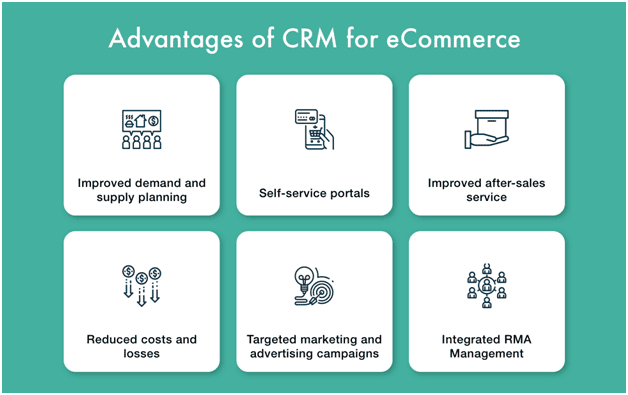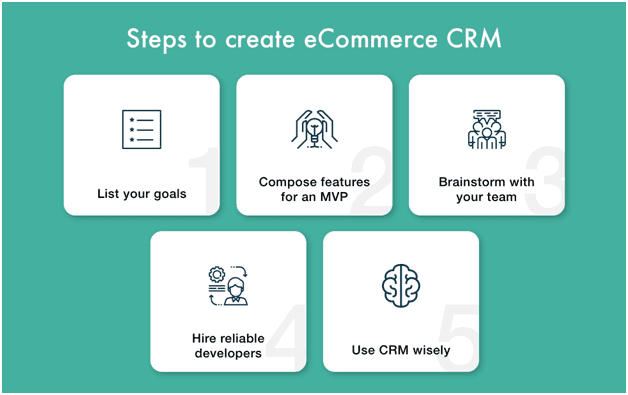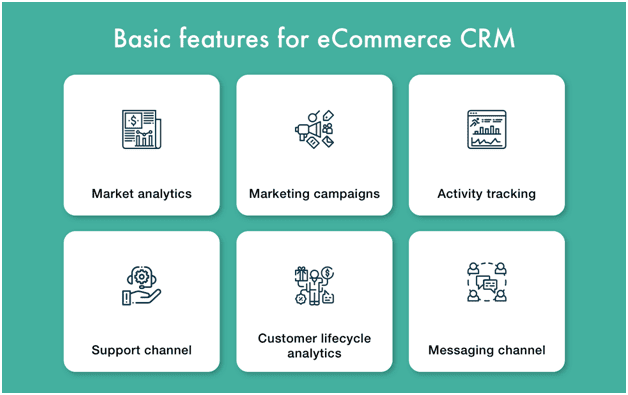CRM solutions help manage and maintain relationships with clients for a B2B sector. Utilizing such systems, it’s possible to register, track, and use all the information connected to the users.
CRM system is profitable for both — customers and businesses. If you want to use the client-oriented approach, you definitely need to integrate a CRM solution.
To satisfy users’ needs and expectations, it’s better to provide them with quality services. For instance, CRM systems allow fulfilling orders faster and more accurately.
Advantages of Using CRM System for eCommerce Business

Let’s discuss some benefits you can get from CRM in eCommerce.
- Sales growth: CRM provides access to the customers’ order and payment history, goods preference, and more. As a result, it’s possible to provide a more personalized experience to the clients.
- Demand prediction: The eCommerce CRM system can also predict the demand for the products. So, the companies can ship the goods to the required warehouses and reduce transportation costs.
- Targeted marketing campaigns: CRM solutions give some personal information about customers. It’s possible to use this data to create personalized advertising campaigns.
- Tracking opportunity: The users can get all the order details, e.g. shipment information, delivery time, and so on.
- Post-sales services: After the purchase, you can make more customized offers and benefits for the clients.
- RMA management: Return Merchandise Authorization stands for sending broken or defective items back. RMA system, in combination with CRM, allows monitoring the status of returning goods, reasons for return, terms for returning, and more.
- Reduced costs: Due to automatic data synchronization, there are no human mistakes and unsuccessful user experience.
Related: How to integrate CRM into your Inbound Marketing Strategy?
How to Choose a CRM Solution?
The modern IT market provides various ready-made CRM solutions. However, it’s also possible to create a custom system.
The question arises — which option to choose: ready-made or custom?
Unfortunately, there is no simple answer. To make a decision, you need to carefully analyze your business goals and requirements along with your budget.
Below there are several options you need to consider.
- Cloud CRM system (SaaS): Such a system is perfect for small and medium businesses since there is no need to spend more money on extra equipment.
- Standalone CRM system: This solution requires the server. On the other hand, it can be adapted according to your requirements.
- Individual eCommerce CRM: It’s possible to develop a custom system that follows your business needs and expectations.
Of course, the best option is creating a CRM system from scratch. Choosing this variant, you get a solution that allows managing and maintaining the data according to your requirements.
Top 3 eCommerce CRM Solutions
There are various ready-made CRM systems on the market, so it’s quite challenging to choose the right one. Below we’ve listed the most wide-spread solutions.
#1. Salesforce
Salesforce is considered as the largest CRM vendor. It provides an out-of-box solution for eCommerce business. It’s possible to tailor SalesforceIQ for your business size, e.g. small, or medium.
Additionally, the service is available on various platforms. There are native apps for Android and iOS, along with a web version and cloud solution.
Salesforce has several exciting features. For instance, the service shows the deals that need special attention. Moreover, you can look through the information about team and employee performance.
#2. Zoho
This CRM provider offers various payment plans depending on the business size. So, it’s possible to choose the variant that fits you the best. Additionally, Zoho allows using many exciting features, even in the standard plan. There are such functions as workflow conversion, email insights, and so on.
As for the enterprise plan, it offers some AI-based features, e.g. Zia Voice, a conversational AI. Moreover, there is an opportunity to integrate custom modules and buttons and implement autoresponders.
#3. HubSpot
One more eCommerce CRM solution is HubSpot. The service provides a lot of exciting features. For instance, HubSpot tracks all customers’ activities automatically through emails, calls, or social media.
HubSpot is completely free of charge service for individual representatives. It supports various platforms; there are apps for iOS and Android, along with a web version of the service.
Related: The Head-to-Head Comparison between Marketo and HubSpot
Reason to Build an Individual CRM System
Besides the obvious, there are other advantages of custom CRM for eCommerce business. We’ve listed some of them below.
- Customization: An individual CRM system is a perfect variant for companies with a complex business model. Such a solution can be customized for any business processes and offer flexible data change.
- No regular payments: Since the company is the owner of CRM, there are no payments like monthly license. Additionally, most ready-made CRM solutions are priced per user. So, if you have an enterprise business, it can be quite expensive. Individual solutions provide an unlimited number of users.
- Scalability: Ready-made solutions tend to work well for small companies. Large businesses have to analyze more customers’ data. So, it’s better to have an opportunity to scale up your CRM system according to the company’s needs and requirements. The custom eCommerce CRM software anticipates business growth. As a result, you won’t spend big money to achieve the required scalability level. Additionally, it’s possible to create a
B2B CRM software to understand your clients’ needs better.
However, a custom-made solution has one significant drawback. Developing an individual CRM system is time-consuming and expensive.
How to Make an eCommerce CRM Software?
There are five main steps to make a custom CRM that follows your business requirements.

- Step #1. Figure out your purposes: It’s better to write down the primary goals for your eCommerce business. Additionally, you need to define issues that need to be solved with CRM software. Such lists can help draw a plan for further system development.
- Step #2. Consider essential features: According to your goals, you need to create a list of crucial features. It’s better to start with creating an MVP version of the CRM. MVP stands for a product with basic features. After that, you can test the system and improve it, depending on your needs.
- Step #3. Brainstorming with a team: You can have a meeting with team members to expand the list of features. Brainstorming is quite profitable since there can appear bright ideas to integrate into your eCommerce CRM software.
- Step #4. Find a reliable team of developers: Making a custom CRM system requires professional software builders. These days, there are two wide-spread variants — hiring in-house engineers or an outsourcing company. Both options have pros and cons. For instance, finding in-house software engineers tends to be time-consuming. However, choosing this way, you get an opportunity to change your project faster. As for outsourcing building, developers from other countries have various hourly rates. So, you can choose a country that fits your budget. On the other hand, it can be difficult to communicate due to different time zones.
- Step #5. Use CRM wisely: You need to understand that eCommerce CRM can’t solve all your problems. Its primary purpose is to optimize the information about your customers and improve their experience.
Creating a custom-made CRM solution for eCommerce, it’s better to focus on the web version. Of course, it’s useful and convenient to have mobile apps for iOS and Android, but their development takes time and money. Small mobile screens tend to be uncomfortable for managing customer relationships.
Core Features for eCommerce CRM
There are some basic features for the CRM system of your eCommerce business.

- Market analytics: This function allows tracking the latest market trends. As a result, you can understand your customers’ needs and increase sales.
- Marketing campaigns: According to the clients’ personal information, you can create more personalized marketing campaigns considering all the peculiarities.
- Activity tracking: Any eCommerce business requires tracking the activities taken by customers, e.g. transactions. This feature allows following all the changes. Additionally, it’s possible to use the collected data to make customers personalized offers.
- Customer support: Creating a custom CRM system, you can integrate complex support channel. As a result, your customers will get qualified help without delays. The system can analyze the request and send it to the right employee. For instance, if there are some technical issues, a tech specialist can give quick feedback.
- Lifecycle analytics: The primary feature of any eCommerce CRM software is analyzing the customers’ behavior. For instance, you can look through the buyers’ order and payment history. According to this information, it’s possible to offer customers exciting products.
- Messaging: Custom-made CRM system allows your employees to send emails to the clients with interesting offers or recommendations. As a result, you can pay the users’ attention to some necessary goods.
As you can see, all these features tend to boost your sales and increase profit. Of course, you can add more advanced features to follow your business requirements. It’s common to start with creating an MVP version and then expand your eCommerce CRM system.
To sum up, there are many advantages of having a CRM system for your eCommerce business. Of course, it’s up to you to decide what kind of solution your business needs — ready-made or custom. You need to carefully analyze your goals and requirements before choosing an appropriate variant.








